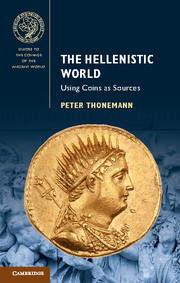8 - Kings
from Part IV - Ideology
Published online by Cambridge University Press: 05 December 2015
Summary
Fancy dress and royal ideology
After a hard day's work conquering Persians, a frat party in fancy dress. Here is the historian Ephippus of Olynthus, an eye-witness to Alexander the Great's last years, on the king's unexpected penchant for cross-dressing:
Alexander used to dress up in sacred costumes at banquets. Sometimes he wore Ammon's purple robe, slippers, and a pair of horns like the god; sometimes he dressed up in the garb of Artemis (which he often wore on his chariot), with a Persian robe and a bow and quiver hanging from his shoulders. On occasion he put on the costume of Hermes: his daily clothing was a purple cloak, an off-white tunic and a Macedonian hat with a royal diadem, but at parties he used to wear sandals, a traveller's hat, and carried a herald's staff in his hand; he also often sported a lion-skin and a club like Heracles.
(FGrHist 126F5)Demetrius Poliorcetes, too, was notorious for his over-the-top clothing, as Plutarch tells us in his gloriously rococo Life of Demetrius:
There was in fact much of the tragic actor about Demetrius. He not only wore the most extravagant clothing and head-gear, Macedonian hats with double diadems and purple robes with golden decoration, but also slippers of rich purple felt with gold embroidery. He also had an amazing cloak, long in the making, with the universe and stars woven into it; this was left half-finished when he suffered his reversal of fortune, and none of the later kings of Macedon dared to use it, although they were hardly modest in their own lifestyles.
(Plut. Dem. 41)We need not take these stories too literally. Ephippus, in particular, is a notorious source of scurrilous nonsense. But like most gossip, these anecdotes do capture an essential truth: Hellenistic royal portraiture really does have a hint of fancy dress to it. Alexander was depicted wearing the ram's horns of Ammon, and there is something theatrical about the coin portrait of Demetrius Poliorcetes, with his immaculate Alexander-style mane of hair, improbably handsome youthful features and shining bull's horns (Fig. 8.1). All that Ephippus and Plutarch have done is to take these fantasy royal images, created for mass public consumption, and pretend that this is how the kings actually behaved in real life (Smith 1988: 38–9).
- Type
- Chapter
- Information
- The Hellenistic WorldUsing Coins as Sources, pp. 145 - 168Publisher: Cambridge University PressPrint publication year: 2016

